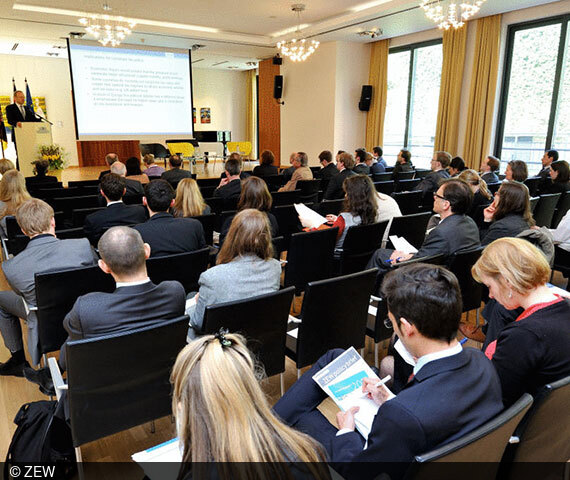ZEW Workshop in Brussels: The Role of Corporate Taxation for a Future Fiscal Union
WorkshopA workshop organised by the Centre for European Economic Research (ZEW) shed light on the potential role of taxation and tax harmonization within the evolution process of a European fiscal union. The workshop with participants from business, European institutions, and academia took place at the Representation of the Federal State of Baden-Württemberg to the EU in Brussels on April 18, 2013.
In his introductory remarks on the issues of taxation in a fiscal union, Prof. Dr. Clemens Fuest, ZEW’s new president, stressed that against the backdrop of the current economic and fiscal challenges in the European Union, removing tax induced obstacles in the Internal Market is of great importance in order to advance economic growth.
Christoph Spengel, Professor of Business Administration and International Taxation at the University of Mannheim and Research Associate at ZEW, and Dr. Erik Röder, Senior Research Fellow at the Max Planck Institute for Tax Law and Public Finance in Munich, discussed the European Commission’s proposal for a Common Consolidated Corporate Tax Base (CCCTB). They pointed out that a triple-CTB, involving consolidation and formula apportionment in addition to a common tax base, still features several unresolved issues, whereas a double-CTB would already entail significant benefits for companies. Referring to a recently published study carried out by ZEW and the University of Mannheim in cooperation with Ernst & Young, they also provided evidence that a double-CTB would be feasible. The study entitled ”Common Corporate Tax Base (CC(C)TB) and Determination of Taxable Income” shows that the deviations between the proposal’s provisions for a harmonized tax base and the Member States’ tax base provisions are limited in both qualitative as well as quantitative terms. The deviations caused by the CCTB were analysed employing the European Tax Analyzer (a computer-based model for international tax burden comparisons) to simulate the tax burden effects for a European model company. By way of a targeted enhancement of the CCTB towards a CCTBplus as proposed by Erik Röder, remedy could furthermore be provided for other fundamental obstacles to cross-border business activity without going as far as the CCCTB.
In the following round table discussion, Erik Röder and Christoph Spengel were joined by Dr. Martina Baumgärtel, Head of Group Regulatory Policy, Allianz SE, and Philip Kermode, Director at the European Commission’s DG for Taxation and Customs Union. Philip Kermode provided some insights into the discussion of the Commission’s CCCTB proposal among the European institutions and the Commission’s current roadmap. Martina Baumgärtel stressed the importance of the CCCTB for Europe’s competitiveness compared to the USA and Asia. In the following discussion, the CCCTB proposal was examined in the light of tax competition and the OECD’s and the EU’s efforts to fight aggressive tax planning.
